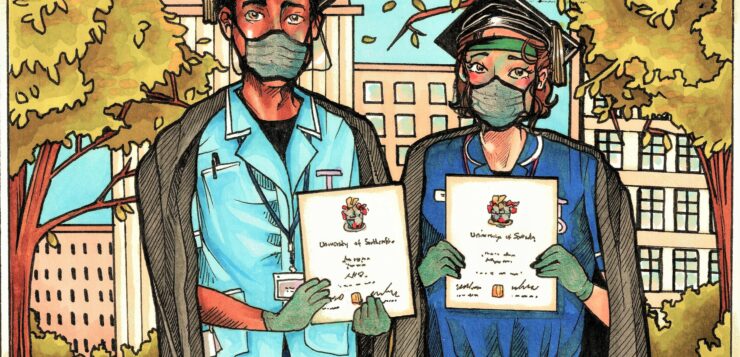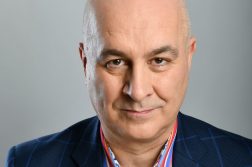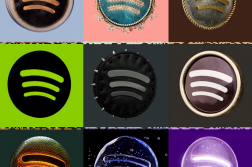Back in August, Wessex Scene Editor Linnea Lagerstedt spoke to recent Nursing graduate Lydia Foreman and Medicine graduate Vikash Dodhia to discuss their experiences working in healthcare during the Coronavirus Pandemic.
To start, could you talk me through how the pandemic affected your course of study?
LF: I was meant to be in uni doing lectures and our last module for our dissertation in April, but with everything happening and the university closing, we were told there would be a possibility we might get pulled into work early. We could choose if we wanted to opt in or not, and then we had to apply online, and I managed to go back to a team I had my fourth placement with last year – community team. We’d gone in in April, and that class is my last placement and I’m being paid for it so it has worked to my benefit. You do go back and regroup with the team for handover, but you’re very much on your own. First two weeks I was with someone and then I was on my own. I’ve had a few days with the supernumerary days with the senior nurses, but it’s been really good and my confidence has definitely developed but it’s been a strange way to go into it. If you chose to not work during the pandemic, you weren’t guaranteed to qualify on time, so if we were to not do it this way it might not have been safe for us to go into a placement until like September.
VD: In Southampton, we sit our finals in January, so we’d pretty much sat all of our exams. In Medicine, fourth and final year is actually kind of one long 18-month stretch ending with two modules called the elective and assistantship. Elective is when you have to spend a certain amount of time away from the hospital you usually spend your placement in, so a lot of people take that as a chance to go abroad and experience medicine in another country. We had that for 8 weeks, and then assistantship which is basically shadowing an F1 to learn how to do the job for four weeks. I’d initially organised to do 5 weeks in Vietnam and 3 weeks in Nepal, but that didn’t work out. There wasn’t a lot of communication and everything was changing really quickly, so we were just sitting there wondering when can we go, what are we doing? It was also quite frustrating because we’d passed our finals, and the next two modules you don’t learn any knowledge it’s just experience. We were pretty much as useful as we were going to be in August, and you see everyone else working really hard and you feel like you could be useful but you can’t, which was a bit frustrating. So, I initially took a job as a doctor’s assistant for two weeks, and then they set up the interim programme. They made a role called interim foundation doctor which is essentially where you are working as a doctor, but a lot of the places had no on-call commitment, and that’s what they were doing in Winchester where I was working.
Considering how quickly you were thrown into the world of work, do you feel you were prepared in terms of both knowledge of the job and your emotional readiness to face what was ahead?
LF: It was difficult, but what helped a lot was going back to a team I was familiar with. Especially being in my final year, I feel like I kind of have been ready to qualify and have been in a position where I have been able to go into a job. At first, it was hard with information as the government was constantly changing their mind on what they wanted, and obviously it was quite a quick decision that there’s gonna be this new placement available and you can opt in, but I think most of us students have been understanding because nobody knows what’s happening.
VD: I think whenever you start working it’s scary, but in terms of missing what I missed from University, I don’t think I was any less prepared than I would’ve been. The module that I missed was essentially what I was now going to be paid to do which was quite nice. Emotionally, I’d say no, but partly I think that is because none of us had experienced Covid medicine and that was quite different and draining. It wasn’t the same as seeing normal sick people because it got bad quite quickly because of the way the disease works.
There’s been a lot of debate and controversy surrounding PPE supply in the UK, did/do you have access to sufficient PPE?
LF: Since I’ve started in the team, we’ve always had masks. There has been a massive demand and a big change. I haven’t been gowning up every time I see patients, but for patients we’ve gone into that are suspected to have Covid, they’ve given us more protection. I always felt safe working and I had some training adapted to the current circumstances on what you do in terms of resuscitation now and in terms of wearing your PPE, which was helpful in preparing me if I was ever in an emergency situation.
VD: Yes. We had very minimal contact with the patients because the consultants were really good and they would go in and then dictate to you the plan so you only had to go in if they were sick to review them. That way, we minimised contact and took a lot of measures. There were people in every other bed, and there was enough PPE. The only thing that was a bit odd was that the rules kept changing, so one day we’d be told we needed a certain mask, and then the next we were told actually you don’t need a mask that good.
How do you feel about campaigns and slogans like ‘Clap for the NHS’ and ‘NHS Heroes’?
LF: I think it’s been nice for the public to do that weekly thing and recognise what the NHS is doing, it’s just a shame it’s taken something as big as this to get that support. I think that support has always been there, but it’s been a reminder to the public what a big impact the services have. Our team have really liked it.
VD: I felt a lot of imposter syndrome. I felt it was more directed to the other doctors, as I had only just started working – they were the ones doing most of the hard work. I get it that from the public that’s a great way to show appreciation, but I think the government jumped on to it maybe a bit too much to distract from the fact that it is massively underfunded and a lot of the issues we’ve come into now is because hospitals have been shrinking and there’s fewer bed spaces. At my hospital, it was not Covid that was the issue, but it was what was happening to the rest of the medicine. There were too many patients, and everyone was a lot sicker because they’d been avoiding coming into hospital. I think the Clap for Carers was a nice gesture, but it doesn’t make up for the funding of the system.
The coronavirus pandemic has had damaging effects of many people’s mental health, especially those working in healthcare. Have you been offered any mental health support during these times? And do you feel you have been given enough recovery time between shifts?
LF: A few weeks ago, they did a wellbeing check on us all, and we’ve had regular one-to-ones with senior members of staff and the support in our team has been really good. We’ve also tried to give as much support as we can to patients, making them aware of the services that are available.
VD: All my colleagues and all the nurses were really supportive, and I definitely felt really comfortable in that sense, but I kind of went into it thinking that we’re just doing a day job filling in a gap. It was the other doctors that were working a lot harder. With Covid, there were a lot more doctors working nights and weekends which meant that there were shortages on the ward during the day, so we came in to fill in during the day. I never felt I was in a position where I could feel bad for myself, because those guys were working like every other weekend, and nights every few weeks. I wouldn’t say there was much formal stuff, but I didn’t feel under-supported.
Beyond what the NHS do, has the university offered you any support during these times?
LF: We get emails from the year group lead and the placement team to check how we’re getting on, and they’ve attached a lot of documents about referring us to the support services at the university as well.
VD: They sent a lot of words of encouragement, letters saying we’re proud of you and that kind of thing, but in terms of emotional support, I don’t think there was that much. The welfare part of the faculty of Medicine has always been really overworked, and I don’t think that’s through anyone’s fault, I think that’s just politics, unfortunately, of how many staff they’re allowed to hire for those roles.
Now that the government is loosening lockdown restrictions, how do you think this will affect the country and your life as a healthcare professional? Do you believe this is a positive or negative development?
LF: I think it’s positive because it has been a few months now, and it is affecting some of our patients, but it’s only possible as long as people are being sensible. It can be a positive thing, but we don’t want to see a big rise again because people are just going back to how things were before.
VD: Lockdown had to end at some point. The whole point of lockdown was to flatten the curve essentially, and people seemed to think it was actually just to stop anyone getting Covid. But then if we do have a second peak, we can’t afford to turn hospitals back to what they were like half-Covid, half-non-Covid. If we were to stop all that elective stuff again, I think it would get to a point where it was almost too late to recover from.
What do you wish the general public understood more about your work, or even the pandemic as a whole?
LF: For those with vulnerable family members, keep looking out for them and being sensible. I know it is really difficult, but if we follow the advice we’ve been given, then we can get through the pandemic and get back to some sort of normality and reunite with our family members again.
VD: I have seen a lot of posts from doctors being like, you don’t understand what’s going on, but I’m sure the public do. What I would say is if people want to break lockdown, I think they need to really understand how nasty the disease can be, especially if you’re from at-risk groups. I was shocked at some of the people I saw ill. They were fighting-fit people, they were not the type of people you would expect to see that sick, and it’s not just that – it’s everything that comes with it if you were to get ill. Covid is a pretty nasty disease if it gets bad.




